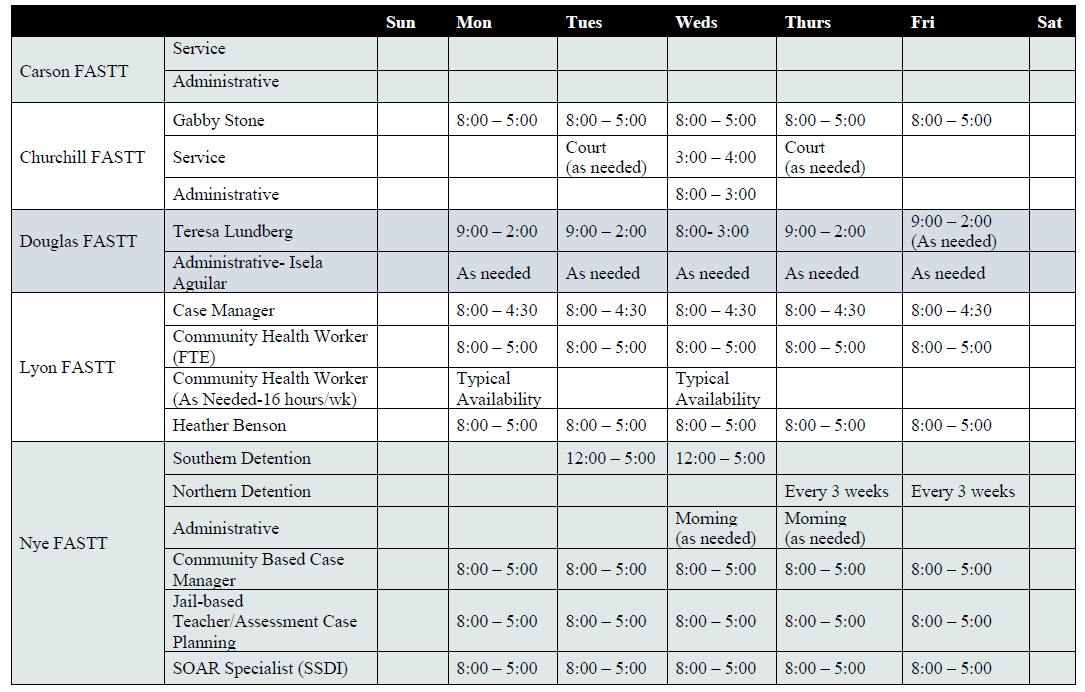Forensic Assessment Services Triage Team: “FASTT”
Data indicate that a significant number of individuals that come in contact with law enforcement and
the criminal justice system have a mental health diagnosis, substance use disorder or, in many cases
both (co-occurring disorders). More than half of all prison and jail inmates (i.e., people in state and
federal prisons and local jails) meet criteria for having mental health problems. Sixty percent meet
criteria for substance abuse/dependence, and more than one-third meet the criteria for having both a
substance abuse/dependence and mental health diagnosis (co-occurring). Approximately one-quarter
million individuals with serious mental illnesses are incarcerated at any given moment. Approximately
half of those arrested are charged with non-violent offenses, such as trespassing or disorderly conduct.
Many of the charges stem from or are highly influenced by the individual’s untreated mental health
disorder(s) or are the result of the high level of dysfunction created by the disorder. Despite the
relatively low level of offense committed, those charged with the crime that has a serious mental
illness tend to stay in jail far longer than their non-disordered counterpart.
The FASTT team was developed in 2012 and represented a community collaboration between mental
health providers, law enforcement, family members, and consumer advocates. The purpose of this
program is to address the behavioral health needs of people involved in, or at risk of involvement in,
the criminal justice system by providing an array of community-based diversion services designed to
keep individuals with behavioral health issues out of the criminal justice system while also addressing
issues of public safety. The FASTT team committee’s goal was to determine the best way to work
with law enforcement to avert arrest if possible, and link the individual with an appropriate level of
care. If an arrest is unavoidable, the FASTT team will work with the inmate at the jail and collaborate
with the court to address treatment needs upon the inmate’s release.
This program of early diversion occurs at the point when law enforcement officers encounters an
individual and suspects this individual has a mental, substance use, and/or co-occurring disorder. The
FASTT program allows the officer to transfer or divert the individual to the care of behavioral health
providers in the community or connect the individual with a FASTT team member in the jail. Early
diversion focuses on the role of law enforcement working collaboratively with community behavioral
health providers to prevent arrest and adjudication. While the emphasis of this program is on diversion
from arrest, early diversion can still occur up to or during the person’s first appearance in court, after
charges have been filed, as services will be offered in the jails, including medication
management, crisis intervention, group therapy, individual therapy, family support, and case
management. This program represents a hybrid between Pre-booking and Post-booking Jail Diversion
interventions (e.g., Mental Health Court). This goal is accomplished by providing intensive,
round-the-clock services in the community. This is accomplished through a Forensic Assertive Community
Treatment model involving street enforcement officers and community-based treatment providers.
Publications and Reports
| Type | Group | Name | Region | Date | Download |
|---|---|---|---|---|---|
| F.A.S.T.T., Report Uploads | FASTT December Meeting Notes | Southern | 01/05/2026 | Preview Download | |
| Best Practices, Criminal Justice System (CJS), F.A.S.T.T., MOST | Nevada Behavioral Health Programming Across the Sequential Intercept Model (SIM) v. 1.0 | Nevada Statewide, Northern, Rural, Southern | 07/23/2024 | Preview Download | |
| Advocacy, Best Practices, Data, Education, F.A.S.T.T., Resources | Forensic Assessment Service Triage Teams – FASTT Year 1 Evaluation Report | Nevada Statewide | 12/13/2022 | Preview Download |


